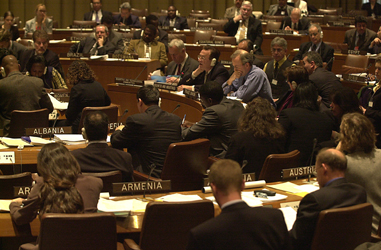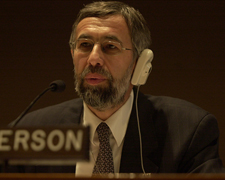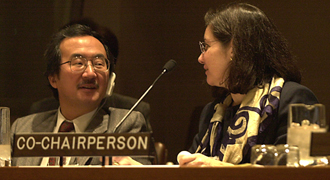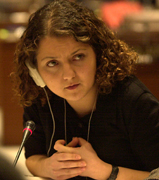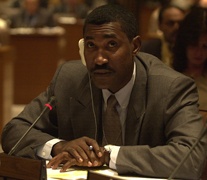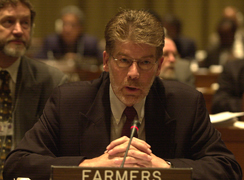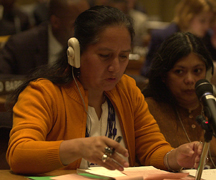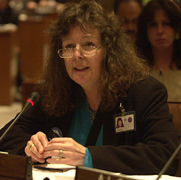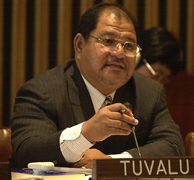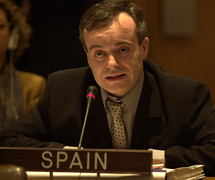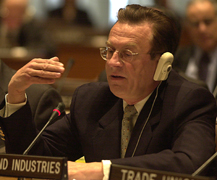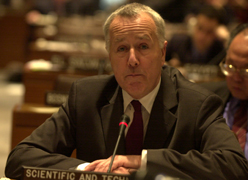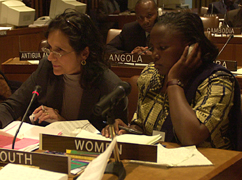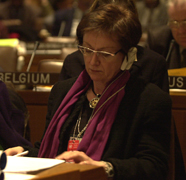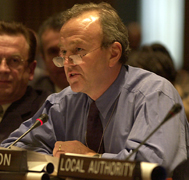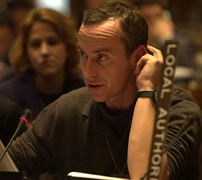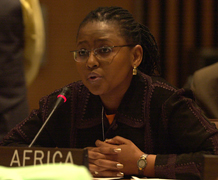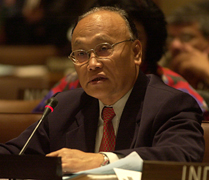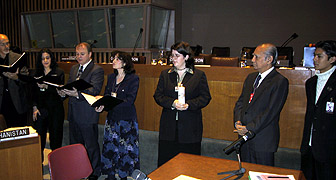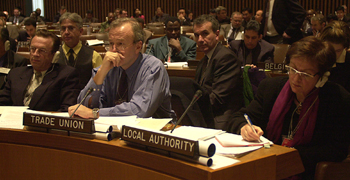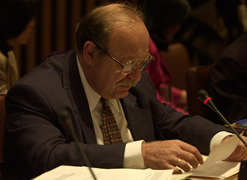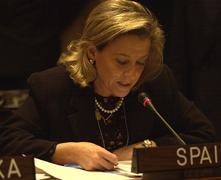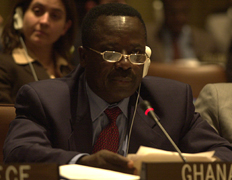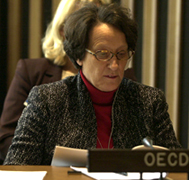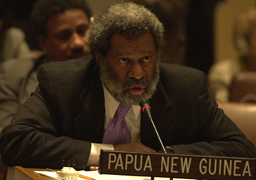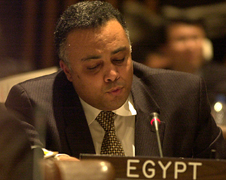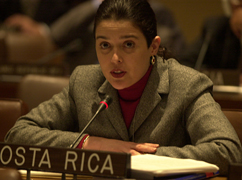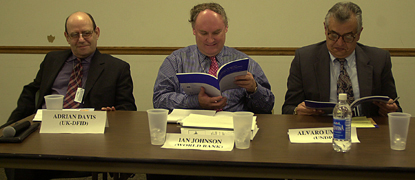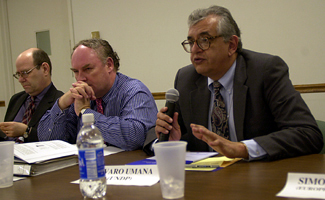|
|
Afternoon: General Statements
|
 Venezuela, speaking on behalf of the G-77/China, said
the Group proposed the following headings for the WSSD:
making globalization work for sustainable development;
poverty eradication and sustainable livelihoods; changing
unsustainable patterns of consumption and production;
promoting health through sustainable development; conservation
and management of resources for development; means of
implementation; sustainable development initiatives for
Africa; and strengthening the system of international
governance for sustainable development.
Venezuela, speaking on behalf of the G-77/China, said
the Group proposed the following headings for the WSSD:
making globalization work for sustainable development;
poverty eradication and sustainable livelihoods; changing
unsustainable patterns of consumption and production;
promoting health through sustainable development; conservation
and management of resources for development; means of
implementation; sustainable development initiatives for
Africa; and strengthening the system of international
governance for sustainable development.
|
| |
 Spain,
speaking on behalf of the EU, said a gender perspective
should permeate all preparations for the Summit. She said
EU priorities in the run up to the summit are, inter
alia, poverty eradication and sustainable livelihoods,
making globalization work for sustainable development,
sustainable patterns of production and consumption, protecting
the natural resources base of economic and social development,
strengthening governance on sustainable development at
all levels, including public participation, and means
of implementation. She supported the idea of a "Global
Deal" as a conceptual framework for the WSSD. Spain,
speaking on behalf of the EU, said a gender perspective
should permeate all preparations for the Summit. She said
EU priorities in the run up to the summit are, inter
alia, poverty eradication and sustainable livelihoods,
making globalization work for sustainable development,
sustainable patterns of production and consumption, protecting
the natural resources base of economic and social development,
strengthening governance on sustainable development at
all levels, including public participation, and means
of implementation. She supported the idea of a "Global
Deal" as a conceptual framework for the WSSD. |
|
|
|
Ghana
said a key objective of the WSSD should be to reinvigorate
international commitment to formulating and implementing
strategies for sustainable development by noting the outcomes
of the Accra Forum on National Sustainable Development
Strategies. He urged the WSSD to agree to significantly
strengthen the UNDP/Capacity 21 Programme as a key institutional
mechanism for implementation of Agenda 21.
|
|
|
|
 Joke
Waller-Hunter, Director, OECD Environment Directorate,
OECD, said OECD Ministers asked the Organization to continue
to assist governments in their work towards sustainable
development by: developing agreed indicators that measure
progress across all three dimensions sustainable development;
further analyzing the social aspects of sustainable development;
and providing guidance for achieving improved economic,
environmental and social policy coherence.
Joke
Waller-Hunter, Director, OECD Environment Directorate,
OECD, said OECD Ministers asked the Organization to continue
to assist governments in their work towards sustainable
development by: developing agreed indicators that measure
progress across all three dimensions sustainable development;
further analyzing the social aspects of sustainable development;
and providing guidance for achieving improved economic,
environmental and social policy coherence.
|
|
|
 The UK reported on the Accra International Forum on National
Sustainable Development Strategies, which examined the
process of furthering the development of a sustainable
development strategy and what principles must underpin
it.
The UK reported on the Accra International Forum on National
Sustainable Development Strategies, which examined the
process of furthering the development of a sustainable
development strategy and what principles must underpin
it. |
|
 Papua New Guinea emphasized the importance of oceans and
lamented that the the issue of oceans was treated as a
separate theme in the Secretary-General's report and called
for a separate them of "Oceans, Coasts and Islands."
He said Pacific Islands are not poor, but they are "capital
poor" and that their strengths lie in the abundance
of ocean resources, and other potential sustainable uses
of oceans
Papua New Guinea emphasized the importance of oceans and
lamented that the the issue of oceans was treated as a
separate theme in the Secretary-General's report and called
for a separate them of "Oceans, Coasts and Islands."
He said Pacific Islands are not poor, but they are "capital
poor" and that their strengths lie in the abundance
of ocean resources, and other potential sustainable uses
of oceans |
| |
 Egypt confirmed support for strengthening of the CSD as
the apex policy-making institution on sustainable development
and called for endowing the CSD with a financial and capacity
building mechanism. He said the international environmental
governance process should not infringe upon the autonomy
of COPs of MEAs nor on the governance structures of other
institutions, and should definitely not lead to the establishment
of a World Environment Organization nor to the use of
environment as a back door for trade protectionism against
the exports of developing countries. He also said that
although water is an international concern, it is best
dealt with at the regional level. He said all efforts,
inter alia, should maximize upstream and downstream
benefits and help the development of water resources and
the protection of water quality for the benefit of all
riparian states.
Egypt confirmed support for strengthening of the CSD as
the apex policy-making institution on sustainable development
and called for endowing the CSD with a financial and capacity
building mechanism. He said the international environmental
governance process should not infringe upon the autonomy
of COPs of MEAs nor on the governance structures of other
institutions, and should definitely not lead to the establishment
of a World Environment Organization nor to the use of
environment as a back door for trade protectionism against
the exports of developing countries. He also said that
although water is an international concern, it is best
dealt with at the regional level. He said all efforts,
inter alia, should maximize upstream and downstream
benefits and help the development of water resources and
the protection of water quality for the benefit of all
riparian states. |
| |
 Costa Rica, on behalf of the Rio Group, emphasized, inter
alia: innovative financial instruments; diversification
of energy sources and promoting their efficient use; further
work to reduce vulnerability to natural disasters; achieving
universality of the CBD; and elimination of subsidies,
protectionist barriers and other trade distorting measures.
Costa Rica, on behalf of the Rio Group, emphasized, inter
alia: innovative financial instruments; diversification
of energy sources and promoting their efficient use; further
work to reduce vulnerability to natural disasters; achieving
universality of the CBD; and elimination of subsidies,
protectionist barriers and other trade distorting measures.
|
| |
 Nauru,
on behalf of the Pacific Islands Forum Group, stressed
the importance of oceans and islands to the Group.
He said their resources must be developed in a sustainable
manner. Nauru,
on behalf of the Pacific Islands Forum Group, stressed
the importance of oceans and islands to the Group.
He said their resources must be developed in a sustainable
manner. |
|
|
 Japan proposed the following measures, inter
alia: to create a society in which people can
enjoy the benefits of sustainable development: expansion
of economic activities that harmonize with nature;
utilization of scientific knowledge and technologies;
measures for mega-cities management; assistance
to developing countries; environmental education;
sustainable management of natural resources; and
social issues.
Japan proposed the following measures, inter
alia: to create a society in which people can
enjoy the benefits of sustainable development: expansion
of economic activities that harmonize with nature;
utilization of scientific knowledge and technologies;
measures for mega-cities management; assistance
to developing countries; environmental education;
sustainable management of natural resources; and
social issues. |
|
|
 Canada addressed the following priority areas: linkages
between human health and environment, particularly
sound chemicals management; strengthening governance;
and promoting an integrated approach to the sustainable
development of natural resources. He also highlighted
the following cross-cutting issues: community-level
work; science and partnerships.
Canada addressed the following priority areas: linkages
between human health and environment, particularly
sound chemicals management; strengthening governance;
and promoting an integrated approach to the sustainable
development of natural resources. He also highlighted
the following cross-cutting issues: community-level
work; science and partnerships. |
|
|
 India highlighted its recent steps towards democratic
decentralization and people's participation in natural
resource management, such as its Joint Forest Management
Programme. He stated that globalization presents
more actual risks than potential opportunities for
developing countries. He noted that environmental
health-related issues, such as diseases associated
with poor sanitary conditions, remain major challenges
for his country.
India highlighted its recent steps towards democratic
decentralization and people's participation in natural
resource management, such as its Joint Forest Management
Programme. He stated that globalization presents
more actual risks than potential opportunities for
developing countries. He noted that environmental
health-related issues, such as diseases associated
with poor sanitary conditions, remain major challenges
for his country. |
| |
|
|

